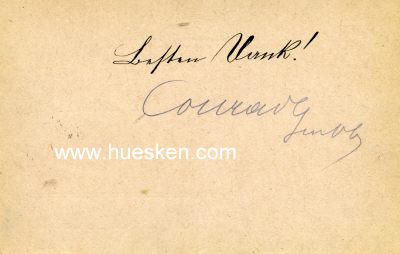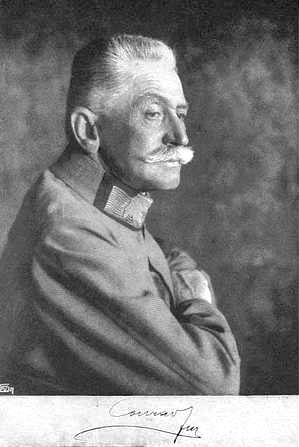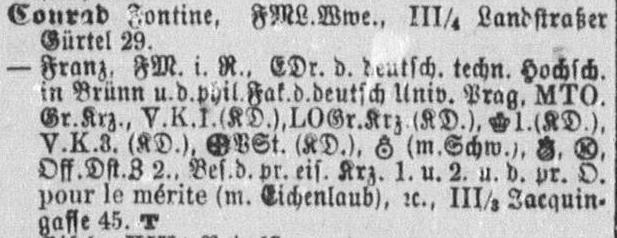"Conrad" is not a given name. "Conrad" is his first surname. Franz is his given name, along with Xaver Josef.
Full name:
Franz Xaver Josef Graf Conrad von Hötzendorf
[given names ] [title] [surname] [nobility] [placename]
WP: Franz Conrad von Hötzendorf
The field marshal, with full name Franz Xaver Josef (since 1910 baron, 1918/19 up to the nobility abolishment count) Conrad von Hötzendorf, was already mentioned during his lifetime as "Conrad von Hötzendorf" or mostly only as "Conrad", which gave the impression that this was his first name. Therefore the following press release appeared in 1914:
We are asked by esteemed parties to draw attention to the fact that the surname of the chief of our general staff is "Conrad", that G. d. I. v. I. Freiherr v. Conrad always signed only "Conrad" and never called himself with his predicate of nobility.
In the Vienna Address Book 1921/22 he was listed as Franz Conrad (with a list of awards received by him, among them two honorary doctorates).
In full the Austrians with their knack for titles would have addressed him at first as "Edler Conrad von Hötzendorf" – indeed not using any given names – and then of course inserting his military rank when he joined the army and then adjusting both according to his rise through the ranks as needed.
His grandfather and his father were already named Edler (title) Conrad von Hötzendorf, as the aristocratic title was inheritable from 1815 onward. Conrad himself was "promoted" in nobility in 1910 to Freiherr (~baron) and then in 1918
to Graf (~count), before being reduced to Franz Conrad in 1919.
Creating a new name for a newly noble in this way was actually the usual procedure for Briefadel and Schwertadel:
In Austria until 1918 it was customary to supplement the name of the new aristocrat with the name of his newly acquired seat of nobility or a new building named after him (e.g. Sigmund Gerstl zu Gerstburg) or – if he did not have one – with a (pseudo-) place name (e.g. "Hofmann von Hofmannsthal"), as is still customary in Great Britain for non-heritable elevations to a lordship today.
Being in the military, he opted for the laconic shortform, just "Conrad", like on this postcard from 1916:

AUTOGRAPH CONRAD VON HÖTZENDORF, Franz Graf. Österreichischer Feldmarschall, Chef des Generalstabes der Armee, Kanzler des Militär-Maria Theresien-Ordens (1852-1925).
Feldpostkarte mit eigh. Unterschrift vom 25. XI. 1916 als Generaloberst. Truppenstempel Cat.No. 545
Or when handing out autographs to his fans:
 Read: Conrad, FM
Read: Conrad, FM
The FM means field marshal. Something he apparently seemed to enjoy quite much. Technically, after the abolishment of the Austrian nobility he was only stripped of the title Graf and the von, making him "Franz Xaver Josef Conrad-Hötzendorf". But he wanted to be listed as just Franz Conrad Field marshal in the phone book:



